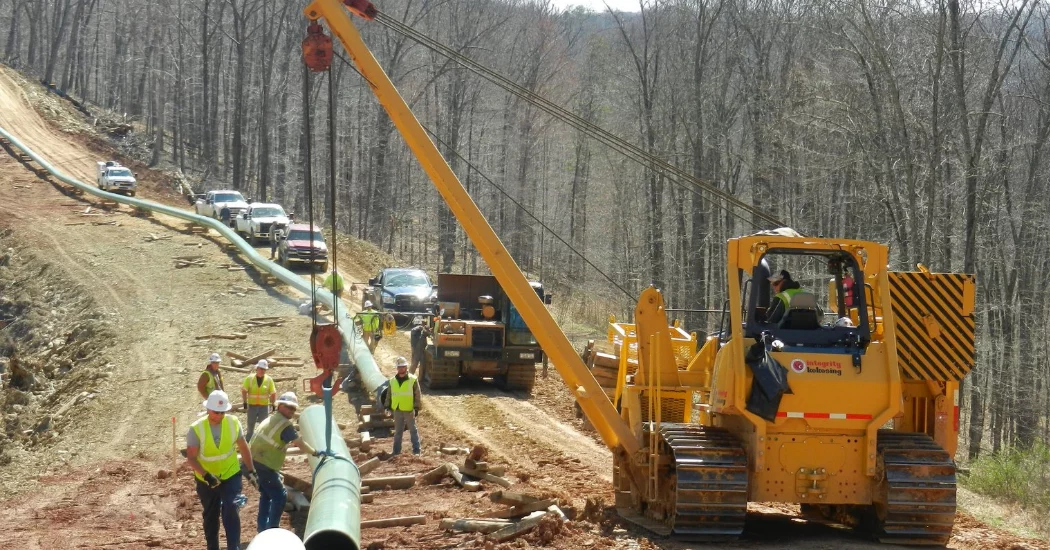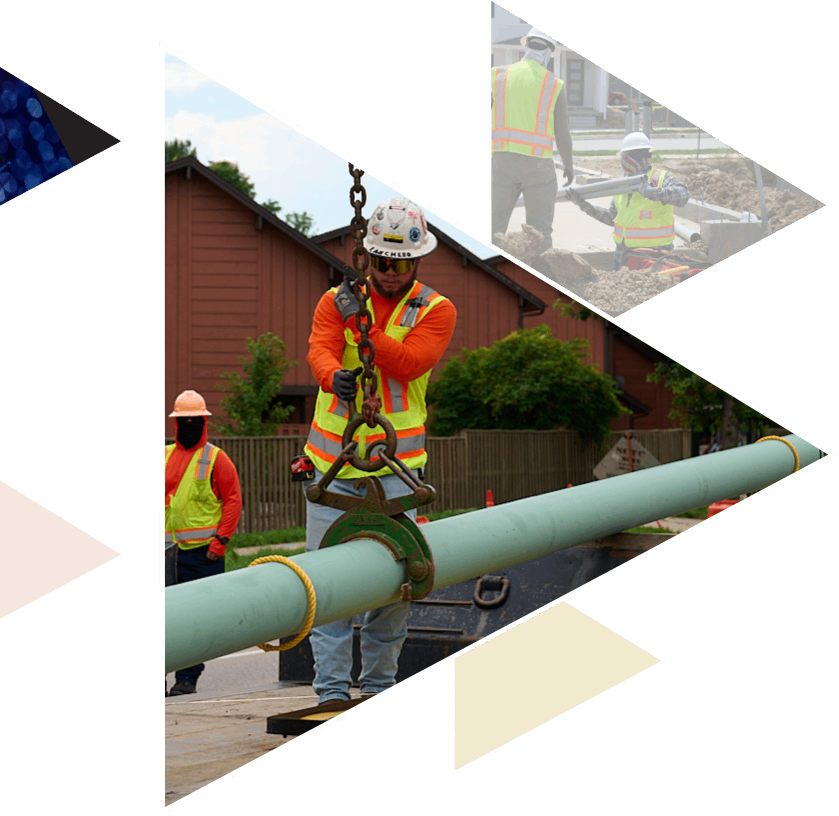How Pipeline Construction Services Use Technology to Improve Efficiency
Wiki Article
The Essential Overview to Comprehending Pipeline Construction Services and Their Significance
Pipeline Construction solutions are fundamental to the transportation of essential sources such as oil, water, and gas. These services entail meticulous preparation and implementation, adhering to stringent security and ecological standards. As the market adapts to modern difficulties, recognizing its elements and ramifications comes to be significantly essential. What aspects contribute to the expanding value of these services in today's economy? The complying with sections will check out these essential aspects.Introduction of Pipeline Construction Services
Pipeline Construction services encompass a range of activities necessary for the installment and upkeep of pipelines used to move various substances, including gas, water, and oil. These services are vital for ensuring the risk-free and effective activity of sources from one area to one more. The procedure generally begins with comprehensive planning and layout, which takes right into account governing demands, environmental considerations, and logistical obstacles.Excavation and grading of the land are carried out to prepare the site for Pipeline installation as soon as preparation is total. This is followed by the actual laying of the pipes, which entails welding or joining sections together to develop a continual flow course. After setup, extensive testing is done to ensure stability and security. Upkeep services are also given to resolve any type of issues that might arise over time. Overall, Pipeline Construction solutions play a critical duty in supporting framework for power and water circulation.
Secret Elements of Pipeline Construction
A successful Pipeline Construction project relies upon a number of vital elements that guarantee the risk-free and reliable setup of the Pipeline system. First, thorough site analyses are essential, as they determine the ecological and geographical elements that may influence Construction. Next, the option of suitable materials, such as fittings and pipes, is crucial for securing toughness and compatibility with the transferred materials.Moreover, advanced Construction techniques, including trenchless modern technology and directional drilling, improve effectiveness and minimize environmental influence. Effective job administration is one more important element, working with labor, tools, and timelines to meet project objectives.
In addition, interaction amongst stakeholders, consisting of engineers, specialists, and regional authorities, warranties alignment on project specifications and needs. Ultimately, comprehensive quality control measures throughout the Construction procedure make sure compliance with industry criteria and maximize the Pipeline's functional life expectancy. Collectively, these components create the backbone of an effective Pipeline Construction project.
Safety Standards and Rules in Pipeline Construction

Improving Regulatory bodies, such as the Occupational Safety and Health Administration (OSHA) and the Pipeline and Hazardous Products Safety And Security Administration (PHMSA), stated specific needs that control Construction methods. These consist of methods for tools use, worker training, and emergency situation response procedures. By implementing these criteria, Construction firms not only protect their staff members yet likewise protected public trust. Ultimately, strenuous security steps add to the lasting success of Pipeline projects, ensuring they fulfill both operational and environmental assumptions.
Environmental Factors To Consider in Pipeline Projects

Ecological considerations are integral to the planning and execution of Pipeline projects. These tasks need to examine possible effect on ecological communities, water resources, and regional wildlife. Conducting complete environmental impact assessments (EIAs) is crucial, permitting stakeholders to identify and reduce dangers before Construction starts.
Protecting sensitive areas, such as marshes and habitats, often requires carrying out specific style attributes or alternative routing to reduce interruption. In addition, Pipeline drivers are entrusted with developing techniques for stopping leaks and spills, which can have destructive impacts on the atmosphere.
Interaction with regional areas is crucial, as public concerns can lead to task alterations that boost environmental security. Compliance with policies set by environmental companies guarantees that projects fulfill sustainability criteria, cultivating a balance in between facilities needs and environmental preservation. Ultimately, addressing ecological considerations not only safeguards nature but additionally advertises neighborhood trust and job practicality.
The Role of Modern Technology in Pipeline Construction
Modern technology plays a necessary function in modern Pipeline Construction, boosting effectiveness and accuracy. Advanced evaluating strategies enable precise preparation and execution, decreasing ecological effect and project hold-ups. Additionally, the assimilation of automation and robotics simplifies procedures, reducing labor prices and improving safety and security on Construction sites.Advanced Checking Techniques
Advanced evaluating methods play a necessary duty in the successful execution of Pipeline Construction tasks. These methods utilize innovative technology to ensure specific mapping and analysis of the surface where pipelines will certainly be installed. Methods such as Geographic Details Systems (GIS), LiDAR (Light Discovery and Ranging), and 3D modeling allow designers to analyze the landscape and visualize, recognizing prospective challenges and ecological concerns. By using these innovative devices, teams can enhance precision in placing and placement, considerably reducing the threat of errors during Construction. Furthermore, real-time information collection enables prompt changes and notified decision-making throughout the job lifecycle. Inevitably, these evaluating innovations add to boosted efficiency, safety, and sustainability in Pipeline Construction efforts.Automation and Robotics

Economic Effect of Pipeline Infrastructure
Pipeline framework plays a crucial duty in promoting and forming regional economies trade. By providing a reliable ways of carrying oil, gas, and various other products, pipes decrease transport costs and boost supply chain effectiveness. This facilities draws in financial investment, stimulates work development, and cultivates economic growth in bordering you can look here areas.The Construction and maintenance of pipes add considerably to regional economies, creating many work opportunities in various markets, from design to labor. The increase of jobs commonly causes increased investing in regional companies, additionally boosting financial task.
Additionally, pipelines improve energy safety by making sure a secure supply of resources, which is crucial for industrial operations and property requirements. As regions end up being interconnected through Pipeline networks, they acquire access to broader markets, increasing competitiveness and financial resilience. The economic impact of Pipeline infrastructure is multifaceted, affecting both immediate neighborhood economic situations and wider regional development.
Future Fads in Pipeline Construction Services
The future of Pipeline Construction solutions is advancing in action to technological advancements, governing modifications, and growing ecological factors to consider. Developments such as robotics and drones are improving inspection and maintenance processes, improving safety and efficiency. Automation is positioned to minimize labor costs and increase accuracy in Construction procedures. Furthermore, the increasing emphasis on sustainability is motivating business to take on green materials and methods, lining up with worldwide initiatives to decrease carbon impacts.Governing frameworks are also adjusting to deal with ecological influences, pushing for better openness and accountability in Pipeline jobs. The assimilation of clever innovations, consisting of real-time surveillance systems, is anticipated to improve important link the dependability and efficiency of Pipeline networks. As power demands shift toward eco-friendly resources, Pipeline Construction solutions will likely see a rise in projects associated with biofuels and hydrogen transportation. On the whole, these trends suggest a transformative period for the Pipeline Construction industry, focused on development and sustainability.
Often Asked Inquiries
What Sorts of Pipelines Are Generally Created?
Different kinds of pipelines are typically built, including oil, water, sewer, and gas pipes - Pipeline Construction Services. Each serves distinct objectives, facilitating the transportation of vital resources across areas while adhering to safety and security and ecological lawsFor how long Does a Typical Pipeline Project Take?
The duration of a common Pipeline job varies considerably, often ranging from numerous months to a couple of years. Factors affecting this timeline consist of task complexity, governing approvals, and ecological factors to consider that must be dealt with.Who Regulates Pipeline Construction Companies?
Pipeline Construction companies are regulated by numerous federal, state, and local agencies, including the Pipeline and Hazardous Materials Safety And Security Management (PHMSA) and state public utility payments, making sure compliance with safety and ecological standards throughout the Construction procedure.What Prevail Products Utilized in Pipeline Construction?
Common materials used in Pipeline Construction consist of steel, polyethylene, and PVC. Each product provides distinctive advantages such as longevity, flexibility, and resistance to rust, making them ideal for various applications in transporting gases and fluids.
Just How Are Pipeline Construction Expenses Estimated?
Pipeline Construction prices are approximated by examining aspects such as material costs, labor rates, task complexity, environmental factors to consider, and regulative requirements (Pipeline Construction Services). Precise cost estimate guarantees reliable budgeting and project planning throughout the Construction processPipeline Construction solutions incorporate a variety of tasks crucial for the installation and upkeep of pipes utilized to move various compounds, including gas, water, and oil. A successful Pipeline Construction job relies on a number of key parts that guarantee the secure and efficient installment of the Pipeline system. Advanced checking techniques play a vital duty in the successful implementation of Pipeline Construction projects. Numerous types of pipelines are frequently built, consisting of oil, water, sewer, and gas pipes. Pipeline Construction expenses are estimated by examining variables such as product costs, labor rates, project complexity, ecological factors to consider, and regulative requirements.
Report this wiki page